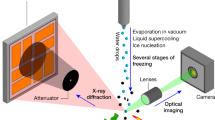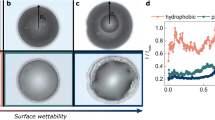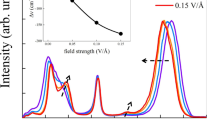Abstract
A RECENT communication1 by Gill and Alfrey implies that we have interpreted the potential differences accompanying the freezing of dilute aqueous solutions as contact potentials. On the contrary, we agree with Gill and Alfrey that “a contact potential difference of 230 volts seems most unlikely”. We further believe that the implied interpretation is completely untenable, because the observed potential differences cause the flow of currents of the order of 1 µamp. The statement in question is that “the potential barrier is at the water-ice interface”. This statement was intended to convey that the charge separation occurs at the interface, and that each ion involved in the charge separation must cross a potential-barrier equal in magnitude and sign to the measured potential difference between the ice and water.
This is a preview of subscription content, access via your institution
Access options
Subscribe to this journal
Receive 51 print issues and online access
$199.00 per year
only $3.90 per issue
Buy this article
- Purchase on Springer Link
- Instant access to full article PDF
Prices may be subject to local taxes which are calculated during checkout
Similar content being viewed by others
References
Nature, 169, 203 (1952).
Phys. Rev., 78, 254.
Author information
Authors and Affiliations
Rights and permissions
About this article
Cite this article
WORKMAN, E., REYNOLDS, S. Production of Electric Charges on Water Drops. Nature 169, 1108–1109 (1952). https://doi.org/10.1038/1691108b0
Issue Date:
DOI: https://doi.org/10.1038/1691108b0
Comments
By submitting a comment you agree to abide by our Terms and Community Guidelines. If you find something abusive or that does not comply with our terms or guidelines please flag it as inappropriate.



